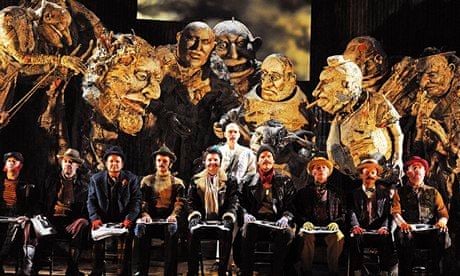Phelim McDermott, director
Seven years ago, English National Opera put me in touch with Philip Glass. We had a coffee, and he mentioned Satyagraha, his 1980 opera about Gandhi's early years in South Africa whose text, adapted from the Bhagavad Gita, is in Sanskrit. He said, "I'm not interested in telling you how to do it, but you have to do the whole piece." I'd heard the work as a student and had never quite connected with it, but listening to it again I got excited, initially more by its themes: group activism and how change happens through the actions of communities rather than one person.
It's not an opera with a linear narrative. It's more like a poem that says: "Look at these moments and think of how they helped the ideas of this man form." Rather than expand these moments narratively, horizontally, it expands them vertically, kaleidoscopically. This is something that all opera can do but, musically, there's more space here than in most.
Designer Julian Crouch and I made some simple, bold decisions about materials: the corrugated-iron concave set, newspaper pages, rolls and rolls of Sellotape – and from these we created big images, such as the huge papier mache puppets. Those were made in the same studio where we rehearsed, and you'd see the chorus looking at all this newspaper and thinking: "What the hell is this?" None of us quite knew how it would evolve – it was the first opera I'd directed.
I drew graphs and charts with highlighter pens that were my own form of musical notation: swirls for this sequence, steps for this bit. There's a process you go through listening to Glass's music – you have to surrender to it. Those repeated rhythmical sequences feel like a kind of meditation; in this opera particularly there's a marriage of themes and music. There was a lot of nervousness: would we be able to pull it off? If I'd known what I was letting myself in for, I'd never have done it. But it's opera. There are so many different elements, so many things that have to come together. You really can't control it and that, for me, is what's interesting about it – its vulnerability.
Of course, there will always be people who don't like Glass's music, but the work struck a chord with many others. When we did it in New York, the Occupy movement was happening just down the road. It really felt like a piece that had found its time.
Alan Oke, Gandhi
Learning the part was the hardest thing. It was a terrible slog. You have no reference points for Sanskrit: it's like learning Klingon – just a lot of sounds. Some people said, "Oh, it doesn't matter – just sing anything." But you can't do that because you'd end up just going "Blah blah blah" all night. I started learning it way earlier than I normally would. I was in Leeds performing at Opera North and I spent an hour every morning on it. The first scene is long and very tricky, but once I'd broken the back of it, things got easier. There are patterns and repetitions, and chunks of text come up again albeit in a different setting or order.
I researched Gandhi before we began, but I wasn't sure how relevant that ultimately was: we weren't doing a biopic. I'm sure we'd all like to associate ourselves with the idea of non-violence, but he wasn't a saint and there are all kinds of other facets to him – for instance, his difficult relationship with his wife. We don't get into that. The opera is more about this man's struggle and the people supporting him.
The rehearsal process with Phelim was very organic. It wasn't, in any sense, a traditional putting on of a show. Nobody said: "You go there; you go there." The sense of stillness I bring to Gandhi is taken from the music, which is often contemplative and meditative. It's an early work: I think if Glass was writing it now, it probably wouldn't be so relentless. But that does add to this feeling of struggling against the odds, putting yourself through physical hardship, in order to attain something. It's a very challenging role, both vocally and physically. You wake up and think: "Oh my word, I've got to do that tonight." But it's actually a very nice world to be in for three hours.

Comments (…)
Sign in or create your Guardian account to join the discussion